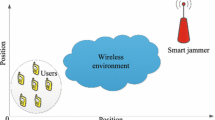Abstract
We consider jamming in wireless networks with transmission cost for both transmitter and jammer. We use the framework of non-zero-sum games. In particular, we prove the existence and uniqueness of Nash equilibrium. It turns out that it is possible to provide analytical expressions for the equilibrium strategies. These expressions is a generalization of the standard water-filling. In fact, since we take into account the cost of transmission, we obtain even a generalization of the water-filling in the case of one player game. The present framework allows us to study both water-filling in time and water-filling in frequency. By means of numerical examples we study an important particular case of jamming of the OFDM system when the jammer is situated close to the base station.
The work was partially supported by the European Research Grant BIONETS and by RFBR and NNSF Grant no.06-01-39005.
Preview
Unable to display preview. Download preview PDF.
Similar content being viewed by others
References
Alpern, S., Gal, S.: The Theory of Search Games and Rendezvous. International Series in Operations Research and Management Science, vol. 55. Kluwer Academic Publishers, Dordrecht (2003)
Altman, E., Avrachenkov, K., Marquez, R., Miller, G.: Zero-sum constrained stochastic games with independent state processes. Math. Meth. Oper. Res. 62, 375–386 (2005)
Kashyap, A., Basar, T., Srikant, R.: Correlated jamming on MIMO Gaussian fading channels. Information Theory, IEEE Transactions on 50(9), 2119–2123 (2004)
Baston, V.J., Garnaev, A.Y.: A Search Game with a Protector. Naval Research Logistics 47, 85–96 (2000)
Brady, M.H., Cioffi, J.M.: The worst-case interference in DSL systems employing dynamic spectrum management, Eurasip Journal on Applied Signal Processing, vol. p.1–11 (2006)
Cover, T., Thomas, J.: Elements of Information Theory. Wiley, Chichester (1991)
Jorswieck, E.A., Boche, H.: Performance analysis of capacity of MIMO systems under multiuser interference based on worst case noise behavior. EURASIP Journal on Wireless Communications and Networking 2, 273–285 (2004)
Kasturia, S., Aslanis, J.T., Cioffi, J.M.: Vector coding for partial response channels. IEEE Trans. Information Theory 36(4), 741–762 (1990)
Lai, L., El Gamal, H.: The water-filling game in fading multiple access channels, submitted to IEEE Trans. Information Theory (November 2005), available at http://www.ece.osu.edu/~helgamal/
Gallager, R.G.: Information Theory and Reliable Communication. Wiley, Chichester (1968)
Garnaev, A.: Search Games and Other Applications of Game Theory. Springer, Heidelberg (2000)
Garnaev, A.: Find a ”Hidden” Treasure”, Naval Research Logistics, 2006 (to appear)
Goldsmith, A.J., Varaiya, P.P.: Capacity of fading channels with channel side information. IEEE Trans. Information Theory 43(6), 1986–1992 (1997)
Suarez-Real, A.: Robust Waterfilling strategies for the fading channel, INRIA. Master SICOM Thesis (2006)
Tse, D., Viswanath, P.: Fundamentals of Wireless Communication. Cambridge University Press, Cambridge (2005)
Author information
Authors and Affiliations
Editor information
Rights and permissions
Copyright information
© 2007 Springer-Verlag Berlin Heidelberg
About this paper
Cite this paper
Altman, E., Avrachenkov, K., Garnaev, A. (2007). A Jamming Game in Wireless Networks with Transmission Cost. In: Chahed, T., Tuffin, B. (eds) Network Control and Optimization. NET-COOP 2007. Lecture Notes in Computer Science, vol 4465. Springer, Berlin, Heidelberg. https://doi.org/10.1007/978-3-540-72709-5_1
Download citation
DOI: https://doi.org/10.1007/978-3-540-72709-5_1
Publisher Name: Springer, Berlin, Heidelberg
Print ISBN: 978-3-540-72708-8
Online ISBN: 978-3-540-72709-5
eBook Packages: Computer ScienceComputer Science (R0)




